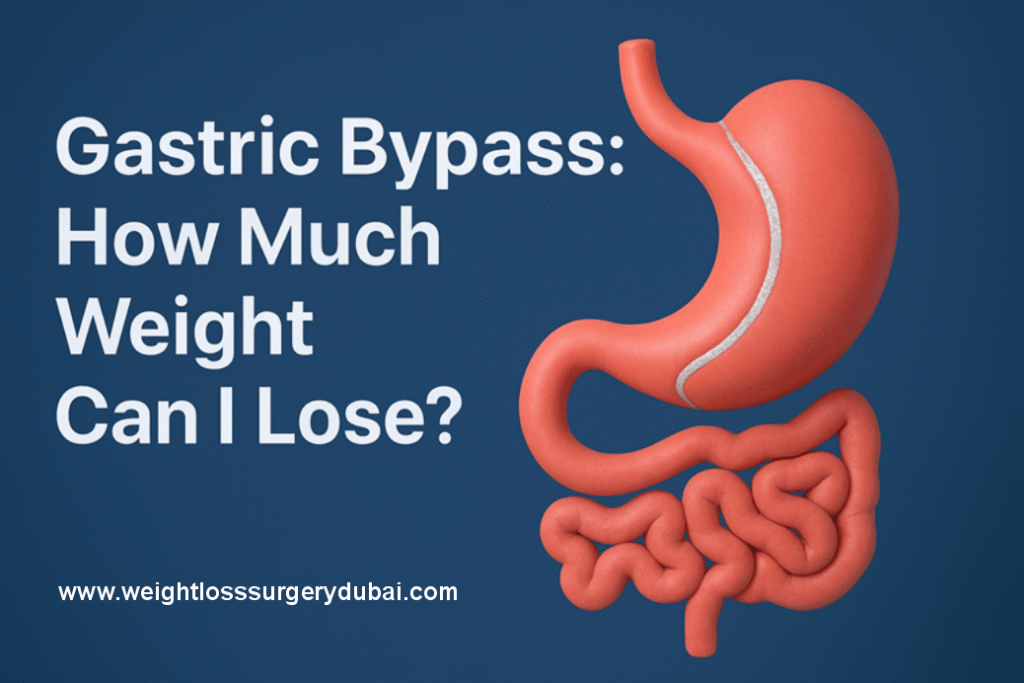
When diet and exercise alone don’t deliver results, gastric bypass surgery often becomes a life-changing solution for people struggling with obesity. But one of the most common questions patients ask before undergoing this bariatric procedure is: “How much weight can I lose after gastric bypass?”
The answer isn’t one-size-fits-all. Weight loss depends on several factors, including your starting weight, lifestyle changes, and commitment to post-surgery guidelines. This article explores expected results, influencing factors, and tips for maximizing long-term weight loss.
How Gastric Bypass Surgery Promotes Weight Loss
Gastric bypass surgery, also known as Roux-en-Y gastric bypass, helps patients lose weight in two ways:
Restriction – The surgeon creates a small stomach pouch, reducing food intake.
Malabsorption – Part of the small intestine is bypassed, limiting calorie absorption.
Together, these mechanisms encourage rapid weight loss, especially in the first year after surgery.
Average Weight Loss After Gastric Bypass
On average, patients lose:
60–80% of excess body weight (EBW) within 12–18 months.
Around 30–40% of their total body weight over two years.
For example:
| Starting Weight | Height | BMI | Excess Weight | Expected Loss (60–80%) |
|---|---|---|---|---|
| 300 lbs | 5’6” | 48 | 140 lbs | 84–112 lbs |
| 250 lbs | 5’5” | 42 | 100 lbs | 60–80 lbs |
| 200 lbs | 5’4” | 34 | 60 lbs | 36–48 lbs |
Key takeaway: The higher your starting BMI, the more weight you’re likely to lose though success depends heavily on lifestyle changes after surgery.
Timeline of Weight Loss After Gastric Bypass
Weight loss is not linear; it happens in phases:
First 3 months: Rapid weight loss (patients may drop 20–30% of excess weight).
3–6 months: Continued steady loss, often 2–4 pounds per week.
6–12 months: Results slow slightly but remain significant.
12–18 months: Patients usually reach their lowest weight.
By the second year, weight stabilizes, and some may regain 5–10% if lifestyle habits slip.
Factors That Influence Weight Loss
Not every patient experiences the same results. Several factors impact how much weight you lose:
Starting Weight and BMI – Higher BMI usually means more pounds lost.
Age and Metabolism – Younger patients often lose faster due to higher metabolic rates.
Gender – Men tend to lose more weight initially because of higher muscle mass.
Lifestyle Habits – Following dietary and exercise guidelines is critical.
Comorbidities – Conditions like diabetes can affect weight loss outcomes.
Mental Health – Emotional eating, depression, or lack of support can slow progress.
Health Benefits Beyond the Scale
While numbers on the scale are important, gastric bypass offers life-saving health improvements. Most patients experience:
Resolution of type 2 diabetes (or significant improvement).
Lower blood pressure and cholesterol levels.
Reduced risk of heart disease and stroke.
Better mobility and joint health.
Improved sleep apnea and breathing issues.
These benefits often appear within months, even before maximum weight loss is reached.
Long-Term Results: Can Weight Regain Happen?
Yes, some patients regain weight after gastric bypass, usually 10–15% of what they lost. Common causes include:
Stretching of the stomach pouch.
High-calorie liquid or snack consumption.
Lack of consistent exercise.
Emotional or binge eating habits.
However, patients who stick to lifestyle guidelines usually maintain at least 50% of their excess weight loss even after 10 years.
How to Maximize Weight Loss After Gastric Bypass
To achieve and maintain the best results, patients should:
Follow the post-op diet strictly – start with liquids, then soft foods, progressing to solid foods.
Avoid high-calorie liquids like soda, alcohol, or sugary juices.
Eat protein-rich meals to preserve muscle mass.
Exercise regularly (at least 150 minutes of moderate activity weekly).
Attend follow-up visits with the bariatric team.
Seek support groups or counseling to address emotional triggers.
Gastric Bypass vs. Other Bariatric Surgeries
Compared to other procedures:
Gastric Sleeve (Sleeve Gastrectomy) – Patients lose 50–70% of excess weight.
Adjustable Gastric Band – Produces 40–50% excess weight loss but less effective long-term.
Mini Gastric Bypass – Similar results to traditional bypass but with shorter surgery time.
Verdict: Gastric bypass generally leads to greater and more sustainable weight loss compared to other bariatric surgeries.
So, how much weight can you lose with gastric bypass? On average, patients lose 60–80% of their excess weight within 18 months, with long-term success depending on diet, exercise, and lifestyle commitment.
While the pounds shed are impressive, the true value lies in improved health, mobility, and quality of life. If you’re considering gastric bypass, remember—it’s not just about the number on the scale, but about reclaiming control over your health and future.
Frequently Asked Questions
Most patients lose weight quickly within the first 6–12 months, with the biggest drop occurring in the first 3–6 months.
It depends on your starting BMI and lifestyle habits. Most patients won’t reach “ideal BMI,” but they achieve a healthy, sustainable weight that significantly improves health.
Ignoring dietary guidelines can slow weight loss, cause nutritional deficiencies, and increase the risk of regaining weight.
Yes. Exercise boosts calorie burn, preserves muscle mass, and helps maintain long-term weight loss.
Yes, it’s considered permanent, though some revision surgeries may be possible if complications occur.
Most patients maintain 50–60% of excess weight loss 10+ years after surgery, especially with consistent lifestyle habits.
